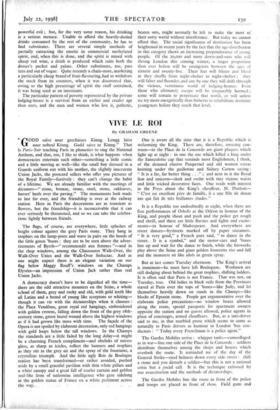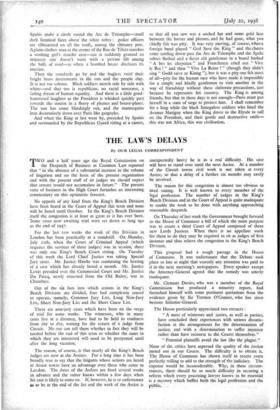VIVE LE ROI
By GRAHAM GREENE
"GODD salve aour grechieuss Kinng. Longg laive aour nobeul Kinng. Godd saive ze Kinng." That is Paris-Soir teaching Paris in phonetics to sing the National Anthem, and that, too, I like to think, is what happens when democracies entertain each other—something a little comic and a little moving as well—like the small boy dressed in a Guards uniform out with his mother, the slightly inaccurate Union Jacks, the postcard sellers who offer you pictures of the Royal Family—furtively : they can't change the habit of a lifetime. We are already familiar with the meetings of dictators—" stone, bronze, stone, steel, stone, oakleaves, horses' heels over the paving." The monuments look made to last for ever, and the friendship is over at the railway station. Here in Paris the decorations are as transient as flowers, but the friendship—it is inconceivable that it can ever seriously be threatened, and so we can take the celebra- tions lightly between friends.
The flags, of course, are everywhere, little splashes of bright colour against the grey Paris stone. They hang in trophies on the lamp-posts and wave in pairs on the hoods of the little green 'buses : they are to be seen above the adver- tisements of Byrrh—" recommende aux femmes "—and in the shop windows, among the Chaussures Walk-Over, the Walk-Over Unics and the Walk-Over Seductas. And as one might expect there is an elegant variation on our flag below Maggy Rouff's windows on the Champs Elysees—an impression of Union Jack rather than real Union Jacks.
A democracy doesn't have to be dignified all the time— there are the odd attractive monsters on the Seine, a whole school of them, grey and rocky and old, with gold teeth like all Latins and a. brood of young like scorpions or whiting— though it can vie with the dictatorships when it chooses : the Place. VendOme, great royal red hangings, embroidered with golden crowns, falling down the front of the grey i8th- century stone, green laurel wound above the highest windows as if it had grown like moss with time. The facade of the. Opera is not spoiled by elaborate decoration, only red hangings with gold loops below the tall windows. In the Champs the standards are a little faded by the long delay—it might be a charming French compliment—and obelisks of mirror glass, as sharp as icicles, reflect the banners and trophies as they stir in the grey air and the spray of the fountains, a crystalline triumph. And the little ugly Bois de Boulogne station has been transformed—or rather avoided, pushed aside by a small graceful pavilion with thin white pillars and a white canopy and a great fall of scarlet curtain and golden seal-like lions of unleonine intelligence who gaze sidelong at- the golden statue- of France on a white pediment across the way. . . , One is aware all the time that it is a Republic which is welcoming the King. There are, therefore, amusing con- trasts—in the Place de la Concorde are giant plaques which light up at night : in one the axe which killed a king under the Sansculotte cap that reminds most Englishmen, I think, of the degmed elusive Pimpernel and old women extras knitting under the guillotine and Sidney Carton saying : " It is a far, far better thing . . ." ; and next to it the Royal lion and unicorn—sleek and svelte with tiny vicious waists and little wicked decorative faces. One reads with interest in the Press about the King's chauffeur, M. Duthoit- " C'est un excellent pere de famine, it a une fille de douze ans qui fait de tres brillantes etudes."
It is a Republic too undoubtedly at night, when there are free performances of Othello at the Odeon in honour of the King, and people shout and push and the police get rough and shrill, and there are little flurries and fights and excite- ments—in honour of Shakespeare. And everywhere are street dances—bystreets marked off by paper streamers. " It is very good," a French poet said, " to dance in the street. It is a symbol," and the motor-cars and 'buses line up and wait for the dance to finish, while the fireworks play above the Seine and giant golden fountains rise and fall and the monsters sit like idols in green spray.
But at last comes Tuesday afternoon. The King's arrival is imminent—he must have left Boulogune. Workmen are still dodging about behind the great trophies, shifting ladders. It is often said that Paris is not France. That was not, on Tuesday, true. Old ladies in black veils from the 'Provinces stared at Paris over the tops of 'buses—like Judy, and let themselves heavily down on stools in the Champs—like blocks of Epstein stone. People got argumentative over the elaborate police precautions—no window boxes allowed along the route, special passports for apartment owners opposite the station and no guests allowed, police agents in place of concierges, armed chauffeurs. But, as a taxi-driver said to me, in that marbled prose which seems to come as naturally to Paris drivers as humour to tondon 'bus con- ductors : " Today every Frenchman is a police agent."
The Gardes Mobiles arrive : whippet tanks--camouflaged as in war—line one side of the Place de la Concorde : soldiers distribute themselves among the shops and houses which overlook the route. It reminded me of the day of the General Strike—steel helmets down every side street : shift a stone and you disturb a soldier—but this is not a national crisis but a asocial call. It is the technique enforced by one assassination and the methods of dictatorships.
The Gardes Mobiles line the route in front of the police and troops are placed in front of them. Field guns and Spahis make a circle round the Arc de Triomphe—small dark fanatical faces above the white robes : police officers are silhouetted on all the roofs, among the chimney pots. A plain-clothes man at the corner of the Rue de Tilsitt searches a working girl's attache case—one is suddenly granted an intimacy one doesn't want with a private life among the balls of wool—as when a bombed house discloses its interior.
Then the standards go by and the buglers twirl their bright brass instruments in the sun and the people clap. It is not too solemn. Black soldiers march side by side with white—and that too is republican, no racial nonsense, a fading dream of human equality. And there is a little good- humoured laughter as the President is whisked quickly past towards the station in a flurry of plumes and breast-plates. The sun has come blindingly out, and the mannequins lean decoratively down over Paris like gargoyles.
And when the King at last went by, preceded by Spahis and surrounded by the Republican Guard riding-at a canter, so that all you saw was a cocked. hat and- some gold lace between the hodes and plumes, and he had gone, what you chiefly felt was pity. It was very moving, of course, when a foreign band played " God Save the King " and the cheers came rattling down past the Arc de Triomphe and the Spahi sabres flashed and a fierce old gentleman in a beard barked " A bas les chapeaux " and Frenchmen cried out " Vive le Roi ! " and then " Vive La Reine ! " (though they didn't sing " Godd saive ze Kinng "), but it was a pity one felt most of all—pity for the human race who have made it impossible for a simple and kindly gentleman to visit another in the way of friendship without these elaborate precautions, just because he represents his country. The King is among friends, but that in these days is not enough—Paris must put herself in a state of siege to protect him. I shall remember for a long while the black Senegalese soldiers who lined the Avenue Marigny when the King drove to the Elysee to call on the President, and their gentle and destructive smile— this was not Africa, this was civilisation,












































 Previous page
Previous page